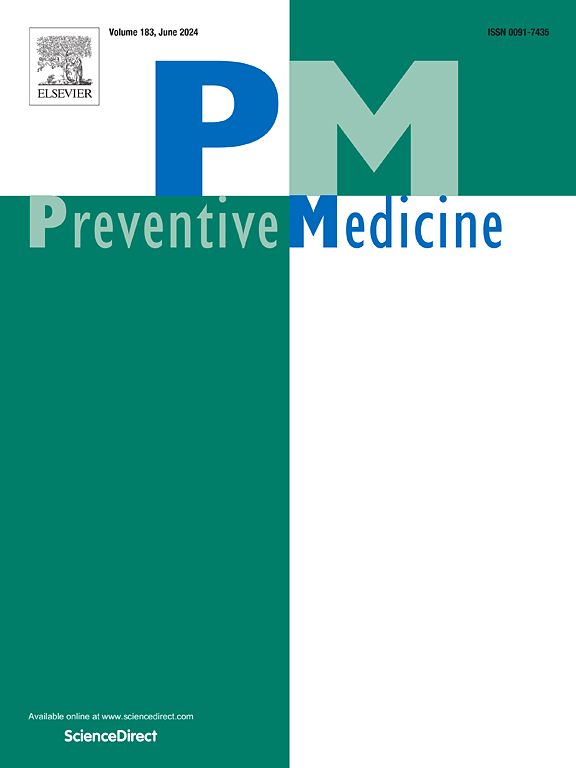Binge drinking and subsequent health and well-being among middle-aged Spanish adults: An outcome-wide analysis
IF 3.2
2区 医学
Q1 MEDICINE, GENERAL & INTERNAL
引用次数: 0
Abstract
Background
Binge drinking has been associated with higher risks of adverse physical health outcomes. Motivations behind binge drinking may involve seeking pleasure and social connectedness, which are important aspects of life that constitute well-being. However, studies that apply a holistic framework of well-being to understand binge drinking remain limited, especially in non-English speaking populations.
Methods
Using longitudinal data from the “Seguimiento Universidad de Navarra” (SUN) Cohort (n = 2837 Spanish university graduates, 51% women, mean age [SD] = 54 [12] years, data collected from March 1999 to July 2022), this study examined the association of binge drinking with a wide range of subsequent psychological well-being, mental health, physical health, and health behaviour outcomes over a four-year follow-up period. A set of regression models were used, adjusting for sociodemographic characteristics, total alcohol consumption and pre-baseline values of the outcome variables.
Results
Binge drinkers reported a higher mean level of positive relations with others (standardized β = 0.12, 95% CI: 0.01 to 0.24) than non-binge drinkers. However, binge drinking was associated with several adverse health outcomes such as higher risks of obesity (RR = 1.86, 95% CI: 1.09 to 3.19), major cardiovascular events (RR = 2.46, 95% CI: 1.04 to 5.82), and unfavourable health behaviours (e.g., a longer screen time by 2.85 hours/week, 95% CI: 0.46 to 5.23).
Conclusions
Our study provides novel insights into the complex and multifaceted relationship of binge drinking with health and well-being. Further research will enhance our understandings of binge drinking and inform culturally appropriate interventions that effectively mitigate its negative consequences.
西班牙中年成年人的酗酒和随后的健康和幸福:一项结果范围的分析
背景:酗酒与不良身体健康结果的高风险相关。酗酒背后的动机可能包括寻求快乐和社会联系,这是构成幸福生活的重要方面。然而,应用健康的整体框架来理解酗酒的研究仍然有限,特别是在非英语国家的人群中。方法:利用来自“纳瓦拉大学”(SUN)队列的纵向数据(n = 2837名西班牙大学毕业生,51%为女性,平均年龄[SD] = 54亿岁,数据收集于1999年3月至2022年7月),本研究在四年的随访期间检查了酗酒与一系列后续心理健康、心理健康、身体健康和健康行为结果的关系。使用了一组回归模型,调整了社会人口学特征、总饮酒量和结果变量的基线前值。结果:与非酗酒者相比,酗酒者与他人的积极关系的平均水平更高(标准化β = 0.12,95% CI: 0.01至0.24)。然而,酗酒与几种不良健康结果相关,如肥胖风险较高(RR = 1.86,95% CI: 1.09至3.19)、主要心血管事件(RR = 2.46,95% CI: 1.04至5.82)和不良健康行为(例如,屏幕时间延长2.85 小时/周,95% CI: 0.46至5.23)。结论:我们的研究为酗酒与健康和幸福的复杂和多方面的关系提供了新的见解。进一步的研究将增强我们对酗酒的理解,并告知文化上适当的干预措施,有效减轻其负面影响。
本文章由计算机程序翻译,如有差异,请以英文原文为准。
求助全文
约1分钟内获得全文
求助全文
来源期刊

Preventive medicine
医学-公共卫生、环境卫生与职业卫生
CiteScore
7.70
自引率
3.90%
发文量
0
审稿时长
42 days
期刊介绍:
Founded in 1972 by Ernst Wynder, Preventive Medicine is an international scholarly journal that provides prompt publication of original articles on the science and practice of disease prevention, health promotion, and public health policymaking. Preventive Medicine aims to reward innovation. It will favor insightful observational studies, thoughtful explorations of health data, unsuspected new angles for existing hypotheses, robust randomized controlled trials, and impartial systematic reviews. Preventive Medicine''s ultimate goal is to publish research that will have an impact on the work of practitioners of disease prevention and health promotion, as well as of related disciplines.
 求助内容:
求助内容: 应助结果提醒方式:
应助结果提醒方式:


